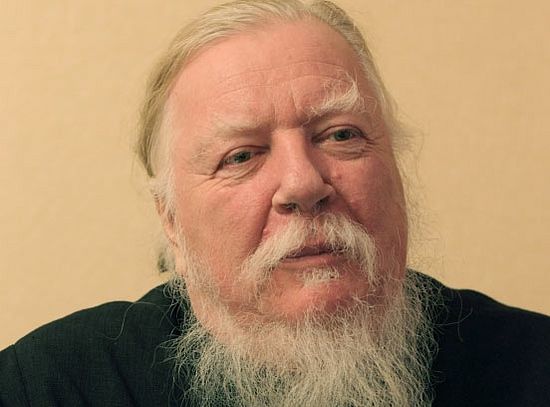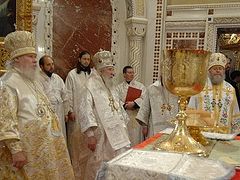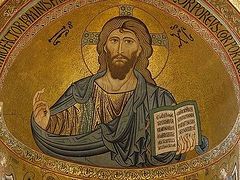Something that Orthodox people from various countries often experience when visiting Russia is a problem stemming from their own name. A Serb named Milorad, a Bulgarian named Lilia, or an American named Donald might piously approach the holy chalice to receive Communion, but when they pronounce their names, heads turn and stare in suspicion. Who is this person’s patron saint? There is no saint Milorad, Donald, etc. Moscow’s well-known archpriest Fr. Dimitry Smirnov dispelled some doubts in an interview with Radio Radonezh on January 14.
Fr. Dimitry: This is a very relevant question, which we touched upon in a recent diocesan meeting, and His Holiness Patriarch Kirill gave a thorough answer to it. However, for understandable reasons there were few laypeople present at that meeting, and therefore I decided to read this question: “My mother was named Lilia, and after she died, the priest refused to serve her funeral because there is no such name in Orthodoxy.” This is a usual story, and it has nothing to do with Orthodoxy. If the priest said that there is no such name in Orthodoxy he is deeply mistaken. There is a Russian custom, a good custom, and we keep it faithfully (my uncle’s wife was also named Lilia)—when we baptize people who have names that are not in the calendar of saints, they are given a name that sounds like theirs: Rustam becomes Rusticus, Lilia becomes Lia, and so on. And no problems arise for those poor uneducated priests.
However, there are some very Orthodox people in very Orthodox churches in very Orthodox countries. For example, in Serbia we might meet the name Dragomir or Tara, but what is Tara? Tara is a river in Montenegro, and children are named after it—the country is Orthodox and the people are Orthodox. It is just that Serbs as a rule do not name people after saints; they give them all different sorts of names but they remain Orthodox. What is so good about our custom?
His Holiness the Patriarch also emphasized that a man who bears the name Sergius has a heavenly protector in St. Sergius. That is how we understand names. But if we look at Georgian names, for example, there are a mass of names that in no way connect with the names of saints. Should we refuse them funeral rites (or Communion, Baptism, marriage)?! Not one priest has the right to do that! A mother or father can name their children what ever they want. If that name does not exist among our saints, then unfortunately that person simply won’t have a saint’s name. Any name can be changed 365 days a year; there is a specific prayer for this in the Book of Needs, and then the person receives Communion with the new name, and there is no problem. That is, this is no reason for refusing funeral rites (Communion, Baptism, marriage, and so on). Therefore in such situations, when a priest refuses to serve the funeral rite for an Orthodox person or give him Communion, it is reported to the dean, who reports it to the bishop, and the problem is quickly taken care of, because not all priests are educated. But all our bishops have higher educations and many even have graduate degrees. This is what bishops are for. As we say in the army, “If you can’t do it we’ll teach you, if you don’t want to do it we’ll make you,” and that will be proper.
Fr. Alexander Berezovsky: An expanded calendar of saints will soon be released here [in Russia] with names that belong to ancient saints who lived before the Great Schism, and possibly names from Local Churches.
Fr. Dimitry: Yes, there will be an expanded list of names, but we still won’t find in it Tara or Dragan, which means simply “dear”—this is a very common name in Serbia. Or Milos, or Vesna, or Snezhana—a perfectly Slavic name, but there is no saint with the name Snezhana; she could be given the name Svetlana at Baptism and have two names. This question does not even need to be asked, never mind answered, because there is no problem whatsoever. You could name someone “Chair” and baptize him that way, and it will still be a perfectly valid Baptism.
Fr. Alexander: There are many monasteries that simply do not accept prayer list with names like that…
Fr. Dimitry: That is absurdity, ignorance, and especially offensive when Orthodoxy is given as the reason. What does this have to do with Orthodoxy? Besides Russian Orthdoxy there is also Greek, Serbian, Bulgarian, Romanian, Georgian, and American Orthodoxy—in America there are entirely American names, and who can object to that, or has objected to it? Only in a few of our monasteries where darkness enlightens. True, His Holiness the Patriarch is concerned about this—even people in monasteries should be given an elementary education so that they might at least come out of this absurdity, because it is a total absurdity that doesn’t exist in any teaching. If you take the Apostle Peter for example, when the Lord named him “Petros”—that name didn’t exist in any calendar of saints, and in fact there was no such calendar. In the same way, Saul became Paul. Oh, how hard it is when ignorance flourishes, and people are hurt by it.
Editor’s Note: While in Russia each Orthodox Christian has a patron saint, in Serbia every family has its own heavenly protector, on whose feast day the family celebrates its “slava”. Arab Orthodox Christians often have both an Arabic name and a Christian name. This is often done to protect children from unwanted attention in Muslim majority schools.





As name 'Milosh' was mentioned above, let's not neglect that Milosh Obilich was the Serbian hero of the Battle of Kosovo (1389) who is numbered among the martyred Saints of the Serbian Orthodox Church. Moreover, in 2004, the Serbian Church included in the calendar of saints several hundred thousand Serb martyrs, civilians murdered during the WWII on the account of their nationality and Orthodox faith, by Croatian Nazis (so called Ustashe). It is almost certain (mathematically) that each and every Serbian name is included among them...